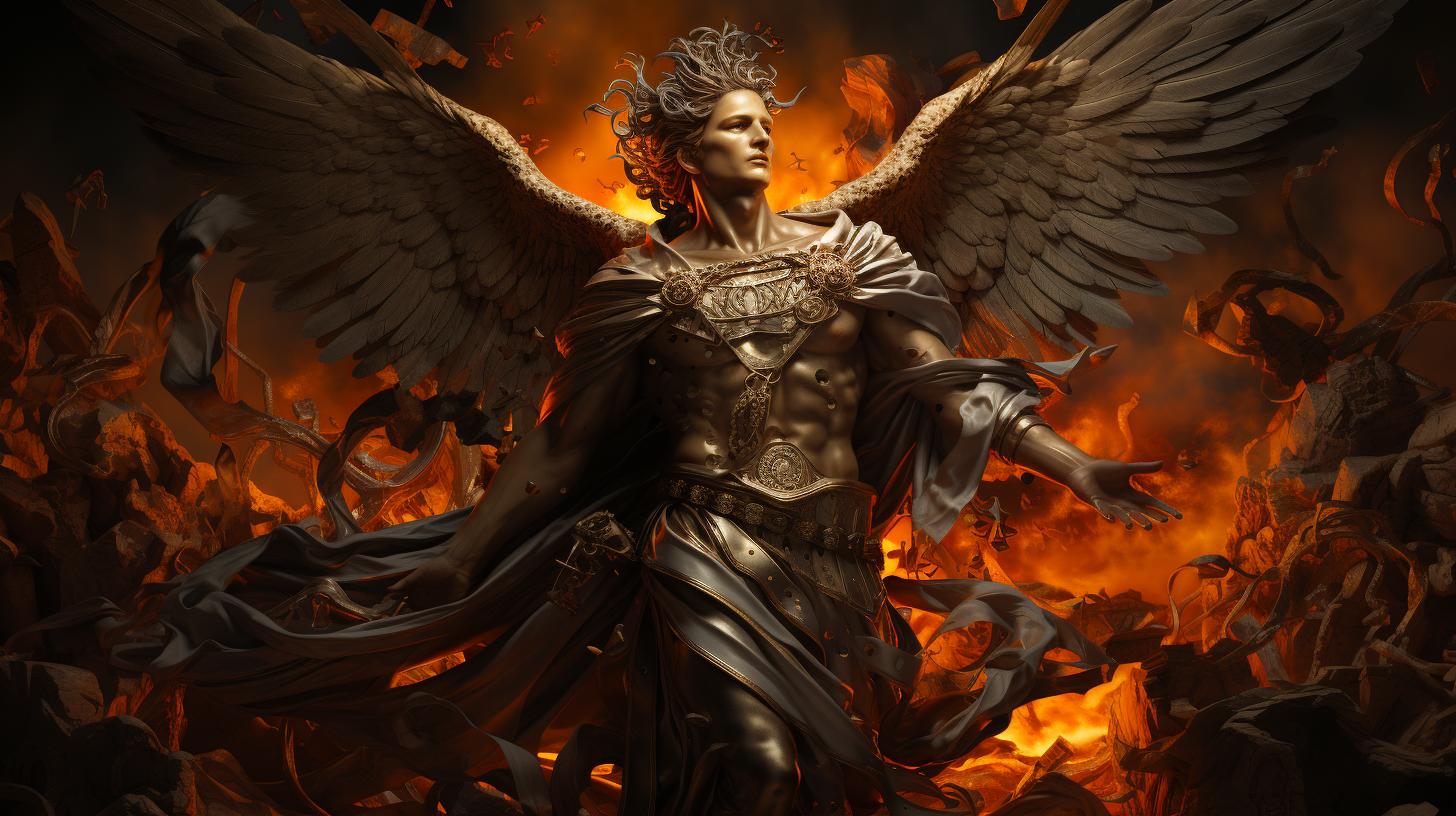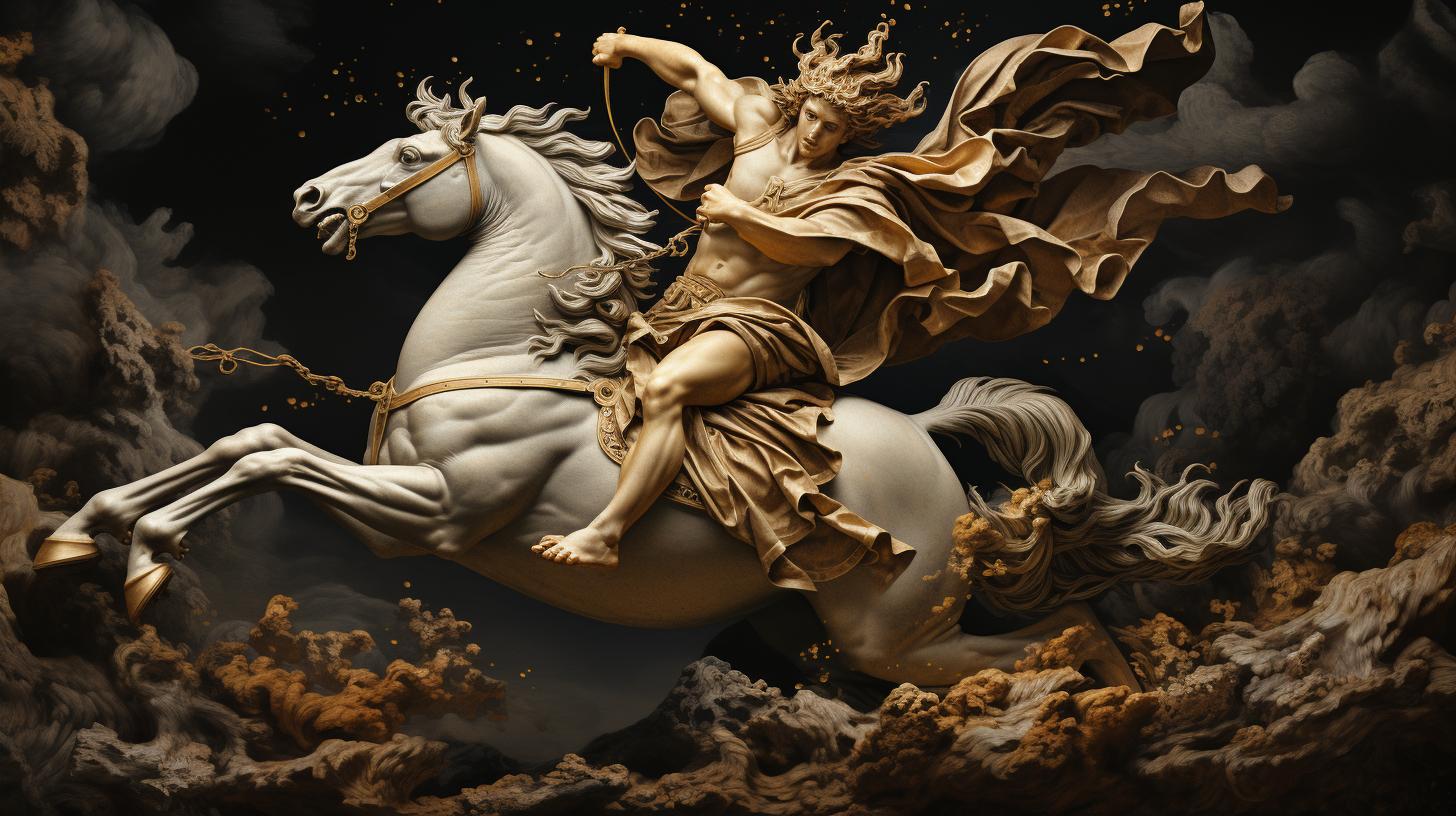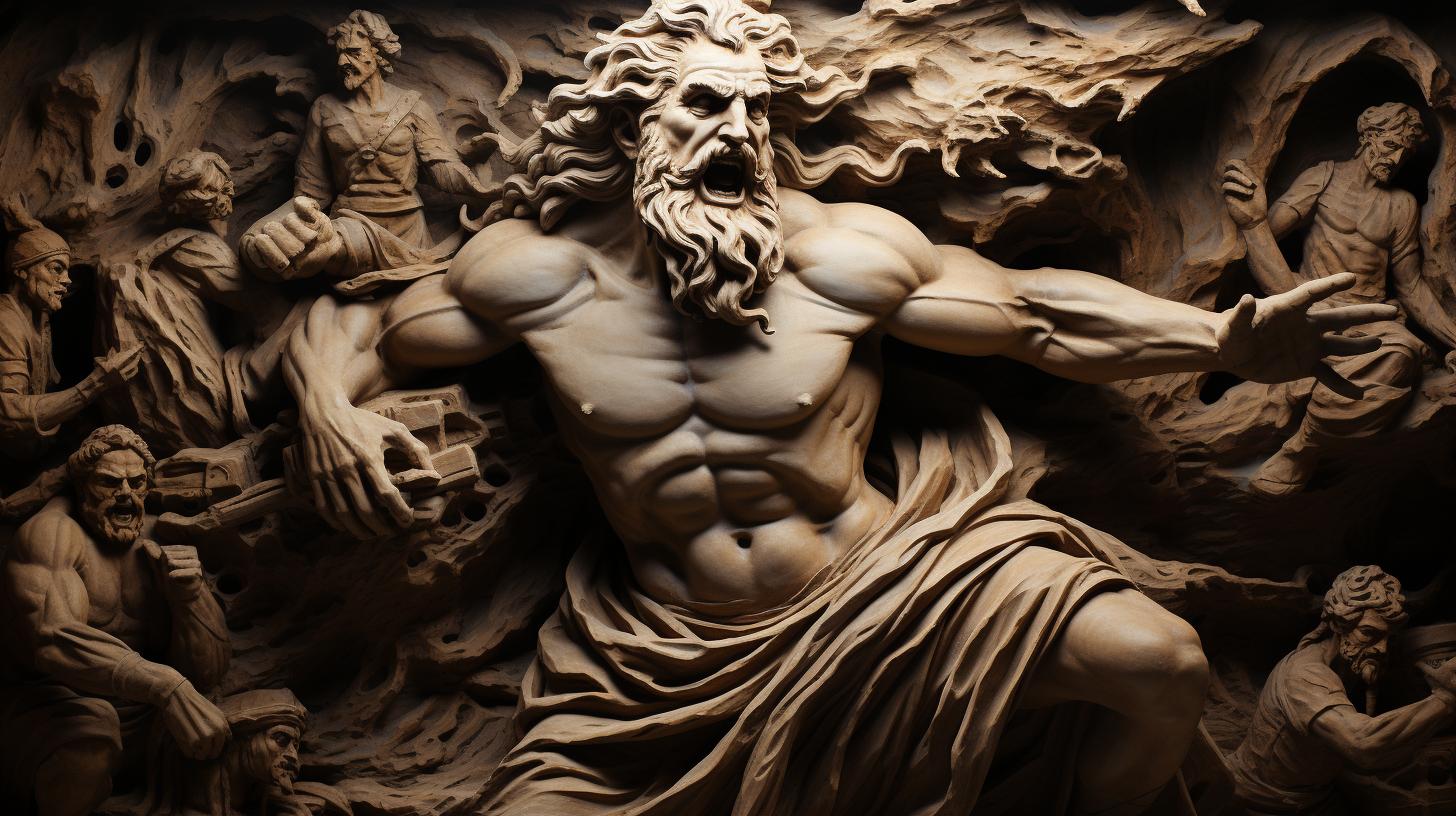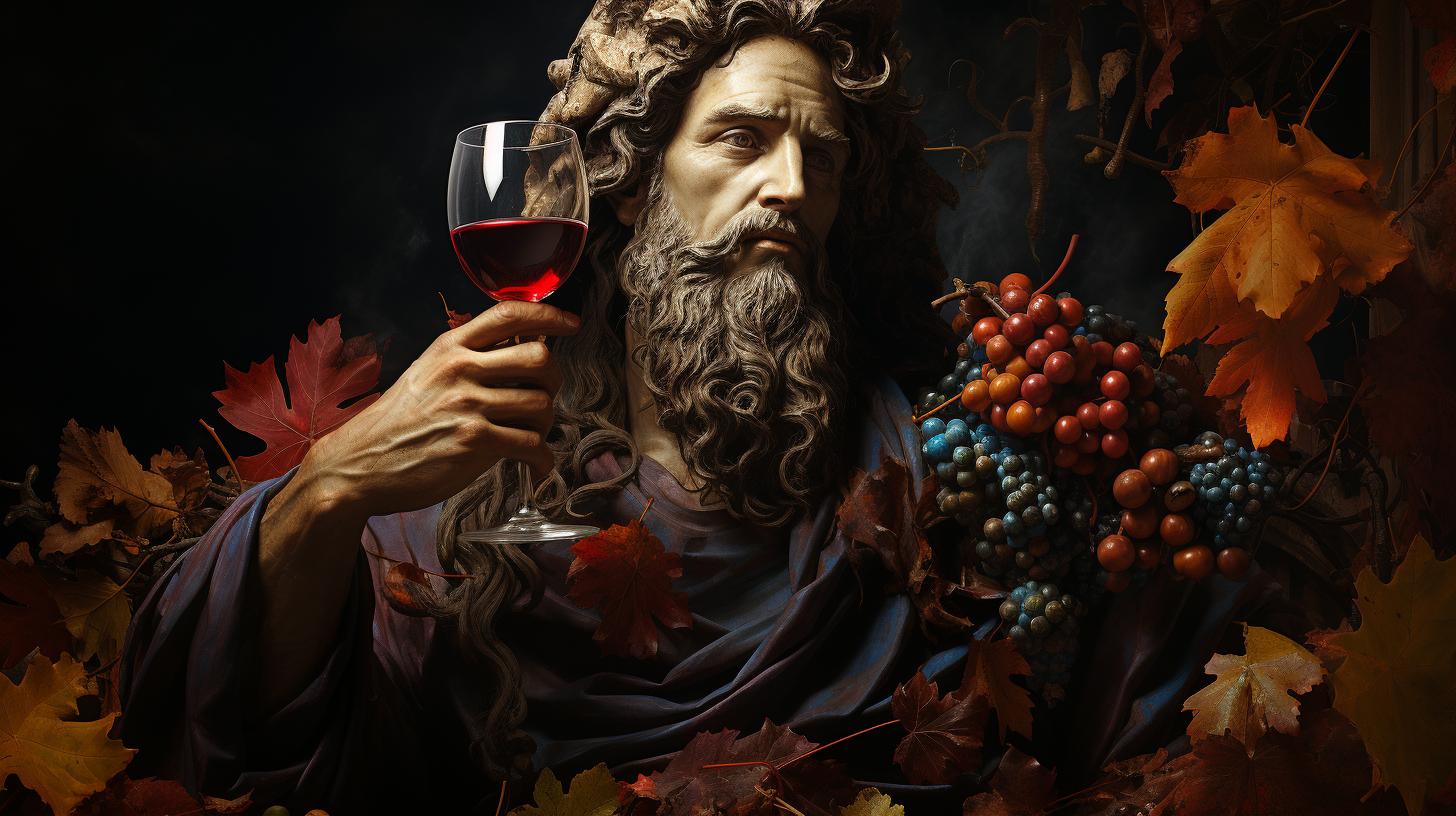Who is Hermes the Greek God Messenger: A Mythological Guide

Hermes, the Greek god messenger, is a prominent figure in Greek mythology. He is known as the divine messenger of the gods and holds various roles including protector of travelers, thieves, and orators.
With his winged sandals and ability to travel swiftly between the mortal and divine realms, Hermes acts as a conduit for messages and guides souls to the afterlife. His symbols include the caduceus, wings, sandals, and other items associated with speed and communication.
Through his stories and adventures, Hermes showcases his cleverness and aids heroes in their quests. As a revered deity, he is worshipped and depicted in ancient Greek art.
Origins of Hermes in Greek Mythology
The mythology of ancient Greece holds fascinating stories about the origins and significance of Hermes, the Greek god messenger.
Let’s explore the various aspects that contribute to the understanding of this mythical figure.
The Birth of Hermes
Hermes was born to Zeus and Maia, a daughter of the Titan Atlas. According to the legends, Hermes exhibited remarkable intellect and agility from an early age. His birth took place in a secret cave in Arcadia, surrounded by lush natural beauty.
Hermes and His Divine Family
Hermes belonged to the illustrious lineage of Olympian gods. As the son of Zeus, the king of the gods, Hermes shared a divine bloodline with deities such as Athena, Apollo, Artemis, and Aphrodite. This familial association connects him to the very essence and fabric of Greek mythology.
Hermes in Ancient Greek Religion
Ancient Greeks revered Hermes as a crucial deity in their religious practices. Known for his multifaceted nature, he held significant roles in various aspects of daily life. From being the protector of heralddry to guiding travelers, Hermes encompassed an array of domains important to the ancient Greek society.
- Hermes was entrusted with delivering messages between gods, bridging the gap between the mortal realm and the realms of divine beings.
- He was also the patron of merchants, travelers, and thieves, symbolizing the boundaries between different societal roles.
- As the psychopomp, Hermes guided the souls of the deceased to the afterlife, ensuring their safe passage.
The inclusion of Hermes in religious rituals and his association with various aspects of life demonstrate the prominence and importance of this Greek god in ancient Greek culture.
Hermes: The Messenger of the Gods
Hermes plays a pivotal role as the messenger of the gods in Greek mythology. His divine duty involves relaying messages from the divine realm to the mortal world and vice versa.
As the messenger, he embodies agility, eloquence, and wit, making him the perfect conduit for communication between the gods and humans.
Hermes as the Divine Messenger
Hermes’ primary role as the divine messenger stems from his exceptional ability to travel swiftly between different realms. With his winged sandals, he can traverse vast distances in an instant, delivering urgent messages from the gods to humans, and even between gods themselves.
His agility and speed are unmatched, making him the trusted intermediary in various matters.
Hermes’ Role in Delivering Messages
As the divine messenger, Hermes is responsible for conveying important messages, commands, and prophecies to mortals on behalf of the gods. Whether it is delivering blessings, warnings, or instructions, Hermes ensures that the messages are accurately transmitted and understood by their recipients.
His eloquence and persuasiveness aid in effectively communicating the intentions of the gods to those who seek divine guidance.
Hermes as the Psychopomp
In addition to his role as a messenger, Hermes also acts as the psychopomp, guiding the souls of the deceased to the afterlife. With his knowledge of the different realms, he leads the souls through the realms of the living, the underworld, and beyond, ensuring their safe passage to their final destinations.
Hermes’ presence brings comfort and assurance to both the deceased and their loved ones, guaranteeing a smooth transition into the afterlife.
Through his divine attributes and responsibilities, Hermes exemplifies the importance of communication, both among the gods and between the gods and humans.
His versatility and grace in fulfilling these roles solidify his position as a significant deity in Greek mythology, embodying the ideals of messenger, mediator, and guide.
Hermes’ Attributes and Symbols
The Caduceus: Hermes’ Iconic Staff
The caduceus is the most recognizable symbol associated with Hermes.
This iconic staff features two serpents entwined around a winged rod. It represents Hermes’ role as the messenger of the gods and his ability to facilitate communication and commerce. The caduceus is also a symbol of healing and is often used as the emblem of the medical profession in the United States.
Wings and Sandals: Hermes’ Symbols of Speed
Hermes’ wings and sandals are powerful symbols of his incredible speed and agility. The wings attached to his sandals allow him to move swiftly between the mortal and divine realms, delivering messages with unparalleled swiftness.
These symbols also signify Hermes’ role as the protector of travelers, as his speed can guide and ensure safe journeys.
Other Symbols Associated with Hermes
In addition to the caduceus and wings, Hermes is associated with various other symbols. The herma, a stone pillar topped with his head and a phallus, represents fertility and boundaries. The Gallic cock and the tortoise are also associated with Hermes, symbolizing vigilance and wisdom.
The palm tree, goat, number four, various fish, and incense are among the other symbols connected to Hermes.
- The herma: a stone pillar with Hermes’ head and a phallus
- The Gallic cock: symbolizing vigilance
- The tortoise: representing wisdom
- The palm tree: associated with victory and resurrection
- The goat: symbolizing fertility and agility
- The number four: believed to be lucky for Hermes
- Various fish: representing abundance and fortune
- Incense: linked to rituals and offerings
By understanding and recognizing these symbols, we gain a deeper understanding of Hermes and his multifaceted nature in Greek mythology.
Stories and Adventures of Hermes
Embark on a journey through the captivating stories and adventures of Hermes, the mischievous and quick-witted Greek god messenger.
The Theft of Apollo’s Herds
One of the most famous tales involving Hermes is the audacious theft of Apollo’s herds. As a mischievous young god, Hermes cunningly devised a plan to steal Apollo’s precious cattle while still an infant.
To cover his tracks, he reversed the cow’s hoofprints and crafted ingenious sandals with wings. These clever tactics allowed him to skillfully carry out his audacious act.
Hermes and His Inventions
Hermes is not only known for his mischievous antics but also his remarkable inventions.
As the god of invention, he gifted the world with numerous ingenious creations. Hermes is credited with the introduction of vital tools such as writing, fire, dice, and musical instruments. His creative prowess benefited the mortal realm, enhancing civilization and human development.
Hermes’ Heroic Assistance
Besides his mischievous exploits and inventive mind, Hermes also played a significant role in assisting various heroes in their quests. He aided Perseus in his mission to slay the fearsome Gorgon Medusa by providing him with winged sandals and a reflective shield.
Moreover, Hermes defeated the monstrous Argos, enabling heroes to triumph over formidable adversaries with his unwavering support.
Immerse yourself in these captivating stories and witness the extraordinary adventures of Hermes, the multifaceted Greek god messenger.
Worship and Representation of Hermes
Hermes, the Greek god messenger, held a significant place in ancient Greek society and religion, often venerated for his diverse roles and attributes. The worship of Hermes was widespread throughout ancient Greece, with numerous temples and sanctuaries dedicated to him.
Let’s explore further the worship practices, artistic representations, and sacred symbols associated with Hermes.
Hermes’ Worship in Ancient Greece
In ancient Greece, Hermes was worshiped as the protector of travelers, thieves, and merchants, providing assistance and guidance along their journeys. He was also revered as the patron deity of shepherds and livestock, believed to bring fertility and abundance to their herds.
Devotees of Hermes sought his favor through prayers, rituals, and offerings at his sanctuaries. These offerings typically included small statues, incense, food, and symbolic items associated with trade and communication.
Hermes in Greek Art and Sculpture
Throughout ancient Greek art and sculpture, Hermes was depicted in various forms and poses.
He was commonly portrayed as a youthful, athletic figure, often shown wearing his iconic winged sandals and holding his caduceus, the symbol of heralds. Artists depicted him during different activities, such as delivering messages, guiding souls to the afterlife, or engaging in his mischievous exploits.
These artistic representations not only showcased Hermes’ physical attributes but also captured his essence as a swift and cunning messenger.
Animals and Plants Sacred to Hermes
- The Ram: The ram was considered a sacred animal to Hermes, symbolizing his association with shepherds and flocks. It represented fertility, protection, and strength.
- The Hare: In some regions, the hare also held a special significance for Hermes.
It embodied qualities like agility and quickness, reflecting Hermes’ swiftness and ability to navigate between realms.
Hermes was also associated with specific plants:
- Saffron Flower: The saffron flower was regarded as sacred to Hermes, valued for its vibrant color and medicinal properties.
It symbolized vitality and beauty.
- Strawberry Tree: The strawberry tree, a native plant of the Mediterranean, was connected to Hermes due to its resilience and ability to grow in diverse environments.
It embodied adaptability and endurance.
These sacred animals and plants were often depicted alongside Hermes in artwork and used in rituals and offerings as a way to honor and invoke his presence and protection.
.




















